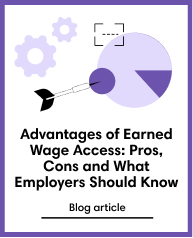Earned Wage Access
Oct 5, 2021
3 Earned Wage Access trends to watch
Subscribe to our newsletter
The world of work has changed rapidly since 2000.
There has been widespread adoption of email.
The explosion of lightning-fast internet.
The arrival of cloud computing.
And the emergence of remote work.
These are just some of the factors that have upended the traditional ebb and flow of work, the office, and even company culture.
Today, more and more workers are also looking to earn a living in different ways.
The always-on nature of service industries and the rise of e-commerce and on-demand delivery have created millions of hourly workers across the globe. Earned Wage Access has slowly risen in popularity against this backdrop.
Three emerging trends shaping the future of EWA
Workers who want more predictable and flexible cash flow have been happy to use products from EWA providers like PayActiv, Wagestream, and Even. And employers — who are in a constant battle to attract and keep good talent — are positioning EWA as a novel perk to the workers they need.
But what does the future hold for EWA?
Let’s take a look at three possibilities.
“Always-on service industries, the rise of e-commerce and on-demand delivery have created millions of hourly workers across the globe.”
1. EWA providers will seek out niches
Right now, many EWA providers are serving companies across a wide range of sectors. However, EWA providers will likely become more focused on a more targeted approach — especially in sectors with high proportions of workers who could find faster pay attractive.
EWA providers will carve out market share in healthcare, aged care, or retail by using EWA to boost recruitment and retention in specific industries.
2. Regulation may transform EWA
EWA will face growing challenges too. That’s because the jury is out on how regulators across the globe will respond to EWA, as it becomes more widespread in their local markets.
EWA companies have long sought to distance themselves from the payday lenders of the past. And yes, they are an entirely different class of company.
But the debate rages on about whether on-demand pay is a loan or not. The question is: will regulators look at some of the subscription fees that EWA providers charge and decide they are, in fact, fees? Fees that are very similar to those that came with payday loans.
3. EWA providers will diversify
Diversification could be one way to stay relevant. For example, EWA providers may look more closely at providing ‘traditional’ payroll services — or other financial services that complement how companies pay their employees.
Payroll has long been an expensive, resource-intensive, and difficult process for large companies. And it only gets harder as companies expand across borders and timezones.
EWA providers may increase their market share if they can provide clever and affordable solutions to these problems. But they will need to do so quickly because other fintech companies and HR technology businesses are already well-established with global companies.
Revolut has recently launched its own EWA product, Payday, which it claims is simple to integrate into existing payroll systems. It’s a sign that competition might be getting hotter for EWA providers everywhere.
Delivering fair payroll products
Whatever the future may hold, one thing is clear. EWA providers and super apps like Revolut are responsible for ensuring on-demand pay is genuinely good for employees. This may mean partnering with innovative fintechs to help them better understand employees’ and hourly workers’ ability to repay. For example, EWAs may be better able to prevent risks around rising non-sufficient funds fees or debt cycles by using alternative credit scoring. And that’s something that really would be good for employers and hourly workers everywhere.
Download our eBook to learn what digital lenders need to know about Earned Wage Access.




